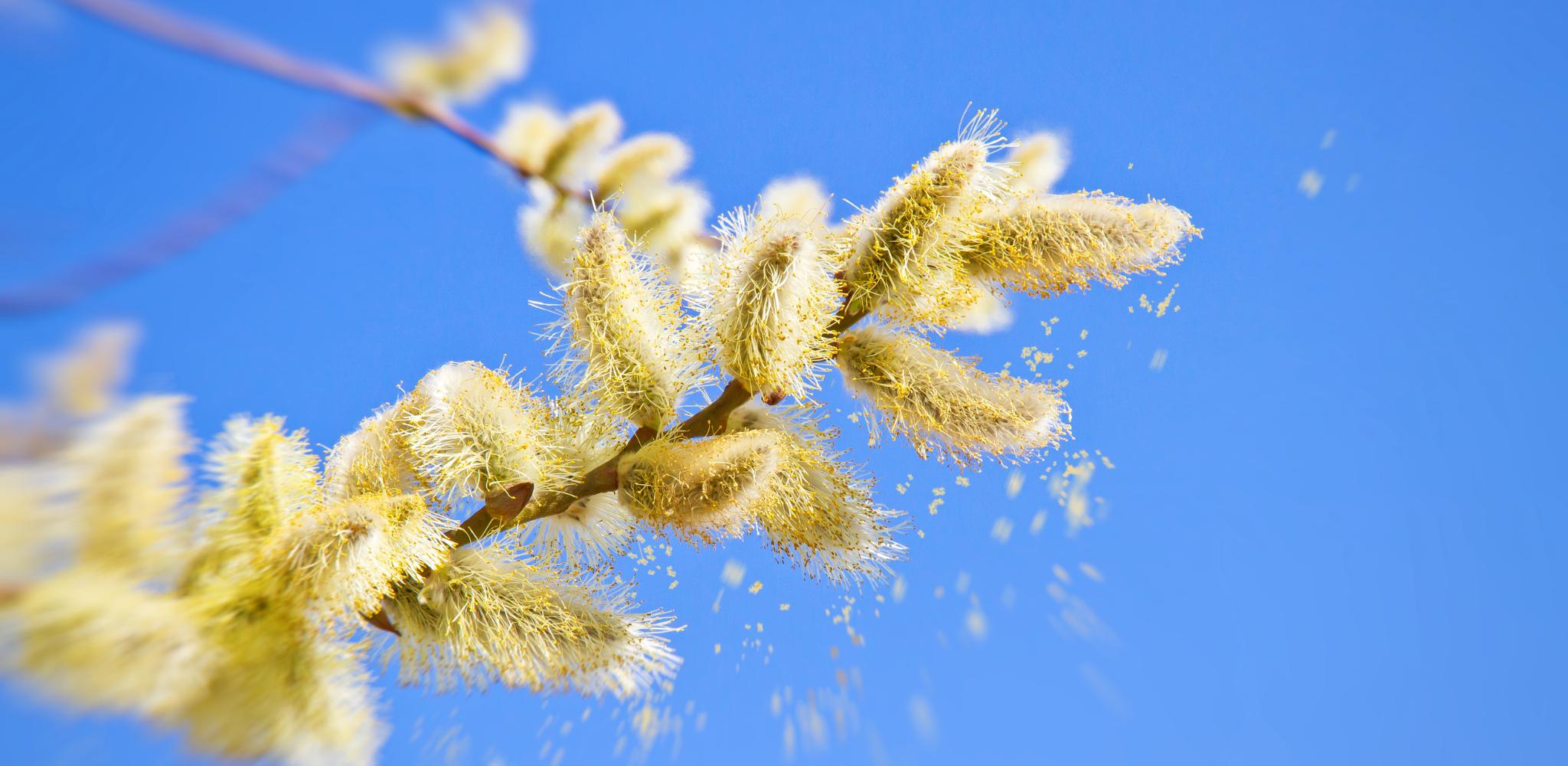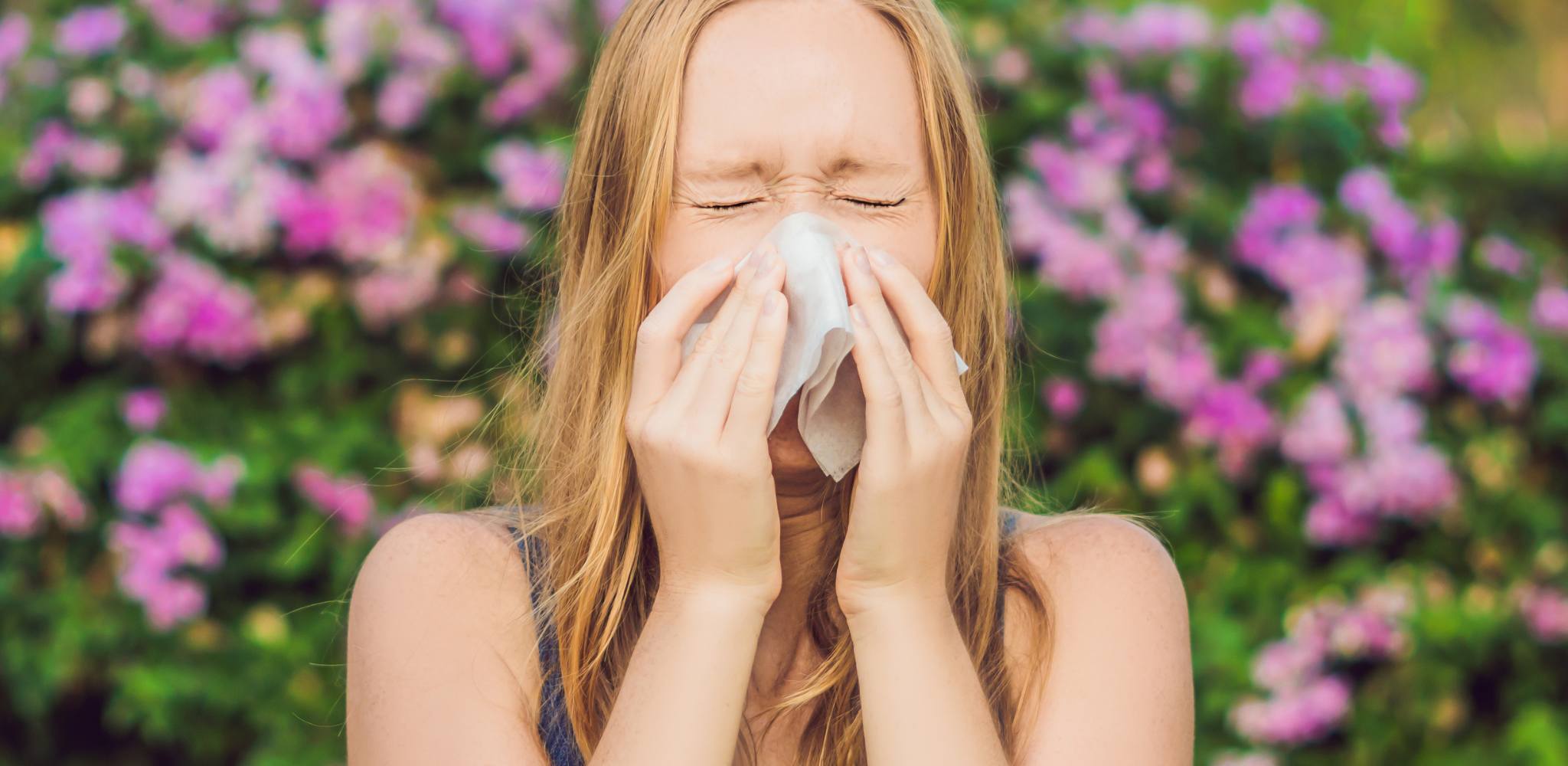Hay fever? No problem! Enjoy spring to the fullest with Natruflex Turmeric
What is hay fever?
Spring is here, and along with blooming flowers and the much-anticipated warmer weather comes the seasonal antagonist for many: hay fever.
Hay fever, also called allergic rhinitis, causes cold-like symptoms. These may include a runny nose, sneezing and itchy eyes. But unlike a cold, hay fever isn't caused by a virus, it is caused by an allergic response to a harmless outdoor or indoor substance the body identifies as harmful (allergen).
Allergens can be inhaled, ingested, or enter through the skin and trigger an immune response causing symptoms of hay fever.
Common allergens that can trigger hay fever symptoms include pollen and dust mites. Tiny flecks of skin shed by cats, dogs, and other animals with fur or feathers (pet dander) also can be allergens.
Pollen is a fine particle released by plants as part of their reproductive cycle. It contains proteins that can cause the nose, eyes, throat and sinuses to become swollen, irritated and inflamed.
You can have an allergy to:
- Tree pollen, released during spring.
- Grass pollen, released during the end of spring and beginning of summer.
- Weed pollen, released in late autumn.
Symptoms of hay fever
- Sneezing and coughing
- A runny or blocked nose
- Itchy, red or watery eyes
- Itchy throat, mouth, nose and ears
- Loss of smell
- Pain around the sides of your head and your forehead
- Rash
- Headache
- Feeling tired

When does hay fever season start and end?
Symptoms are usually worse between late March and September, especially when it's warm, humid and windy. This is when the pollen count is at its highest.
You can check the latest pollen count here
How do you know if it's hay fever or a cold?
As allergies and colds share many of the same symptoms, it can often be difficult to determine which you are suffering from.
Hay fever can last for weeks or months, unlike a cold, which usually goes away after 1 to 2 weeks. Symptoms of a cold may include a sore throat or fever whereas these are uncommon if you are suffering from hay fever.
Hay fever and the immune system
Symptoms of hay fever occur because the immune system perceives the allergens as harmful invaders and goes into defence mode.
- Immune system trigger: When someone with hay fever comes into contact with an allergen (like pollen), their immune system responds by recognising these particles as potential threats. In individuals sensitive to these allergens, the body's immune system treats them as if they were harmful pathogens, such as viruses or bacteria.
- Production of antibodies: The immune system produces immunoglobulin E (IgE) antibodies specific to the allergen. These antibodies are part of the body's adaptive immune response, designed to recognise and bind to the allergen upon future exposure. Each IgE antibody can be very specific, reacting against certain pollens and allergens. This means that a person can be allergic to one type of pollen, but not another.
- Activation of mast cells: The IgE antibodies attach to mast cells, which are a type of white blood cell found in great numbers in surfaces exposed to the external environment, such as the skin and mucous membranes in the nose. Mast cells are loaded with granules containing histamine and other chemicals.
- Release of histamine: When the allergen enters the body again and binds to the IgE antibodies on mast cells, it triggers the cells to release their contents, including histamine, into the surrounding tissues and bloodstream.
- Symptoms of hay fever: Histamine binds to receptors on nearby blood vessels and other cells. This binding causes the blood vessels to become more permeable, leading to leakage of fluid into the tissues, which causes swelling and contributes to typical hay fever symptoms like a runny nose, watery eyes, and sneezing. Histamine can also irritate nerve endings, leading to itchiness.

Who is most at risk of hay fever?
Research has found that 49% of the UK has had hay fever symptoms, affecting millions of individuals and making it one of the most common allergies.
Certain factors can make some individuals more susceptible to hay fever than others. Understanding who is at higher risk can help in prevention and management strategies. Here are key groups and factors that influence susceptibility to hay fever:
- Having asthma
- Having other allergies
- Having atopic dermatitis or eczema.
- Having a genetic predisposition to asthma or eczema.
- Younger children and adults are more likely to suffer from asthma and often symptoms improve with age.
- Living or working in an environment that constantly exposes you to allergens — such as pollen, animal dander or dust mites.
- Being exposed to smoke and strong odours that irritate the lining of the nose.
- Some alcoholic drinks, particularly beer and wine, contain histamine which can exacerbate allergy symptoms.
How to manage hay fever?
There is an increasing number of adults and children suffering from hay fever and its symptoms. Symptoms can sometimes be mild however some individuals can find it has a substantial impact on their day-to-day life – interfering with how well you perform at work or school.
Here’s what you can do to help make the most of spring and summer and minimise your symptoms.
Limit exposure to allergens
Stay indoors on high pollen days: Check daily pollen forecasts and try to stay indoors when pollen counts are high, typically on dry, windy days.
Close windows: To prevent pollen from entering your home or car, keep windows closed during pollen season and use air conditioning, if possible, which helps filter out pollen.
Use air purifiers: Consider using air purifiers with HEPA filters in your home, especially in bedrooms, to remove pollen, dust, and other allergens from the air.
Personal hygiene and clothing
Pollen can accumulate on your clothing and hair, so it’s advisable to change clothes and take a shower after returning indoors to remove any allergens.
Wear sunglasses and a hat to help keep pollen out of your eyes and off your hair.
Wash bedding regularly using hot water weekly to remove allergens.

Manage indoor air quality
Regularly vacuum with a HEPA-filter vacuum cleaner and dust with a damp cloth to reduce indoor allergens like dust mites and pet dander, which can exacerbate hay fever symptoms.
Control humidity using dehumidifiers to keep indoor humidity below 50% to help prevent the growth of mould, which can trigger symptoms.
Diet and medications
Stay hydrated: Drinking plenty of fluids can help thin nasal secretions, making it easier to breathe, and relieve a stuffy nose and irritated throat.
Regular use of a saline nasal spray can help rinse allergens out of your nasal passages and relieve congestion.
Antihistamines: These can help relieve sneezing, itching, a runny nose, and watery eyes by blocking histamine, the substance your body makes during an allergic reaction.
Decongestants: These can provide temporary relief from nasal stuffiness but should not be used for more than a few days without consulting a doctor.
Nasal corticosteroids: These sprays help reduce nasal inflammation and are most effective when used before symptoms start and regularly during the allergy season.
Over the counter or prescribed medications like antihistamines, decongestants, and corticosteroid nasal sprays can help alleviate hay fever symptoms. Some possible side effects of antihistamines include drowsiness, dizziness, dry mouth, blurred vision, and constipation.

While there are numerous over-the-counter options to help manage symptoms of hay fever, an increasing number of people are turning to natural remedies to avoid side effects and potential medication interactions.
Natruflex Turmeric
Natruflex Turmeric contains high-strength turmeric. It is the presence of the bioactive compounds known as curcuminoids which have been proven to have powerful anti-inflammatory properties.
Symptoms of hay fever such as sneezing, nasal congestions and sinus pressure are largely driven by inflammation caused by the immune system's response to allergens. Turmeric will help to mitigate this response by inhibiting certain pathways and enzymes in the body that lead to inflammation.
Natruflex Turmeric can be taken as a preventative therapy to stop the onset of symptoms as well as taken when symptoms are present to reduce their severity.
Adults and children (12+) can take ONE to TWO capsules daily depending on their symptoms.
For optimal results, our pharmacists recommend taking 1 capsule of Natruflex Turmeric daily before hay fever season starts (March) and continue throughout spring/summer to keep symptoms well controlled.

Gut Love
The gut microbiome, which is the ecosystem of bacteria and other microorganisms living in the digestive tract, plays a critical role in the development and function of the immune system.
As we now know, 70% of our immune system is located in the gut. It is therefore no surprise that a healthy gut microbiome will promote a balanced immune response, which can prevent overly aggressive reactions to non-harmful substances like pollen, thereby potentially reducing allergic responses.
Many factors can damage the balance of healthy bacteria in the gut such as stress, medications and illness. Gut Love contains 19 strains of healthy bacteria and will help to restore the balance of the gut microbiome.
Gut Love is our award-winning symbiotic supplement (containing pre and probiotics) that will help to support the gut microbiome and modulate our body’s immune responses by promoting tolerance to allergens and reducing the inflammatory response associated with hay fever.
Some studies have suggested that certain probiotics can reduce the symptoms of hay fever. For example, strains such as Lactobacillus paracasei, Lactobacillus fermentum, and others have shown potential in clinical trials to reduce eye and nasal symptoms of hay fever. Both of these strains can be found in Gut Love.
Our pharmacists recommend taking TWO capsules of Gut Love each morning with breakfast.
Rhinodoron
Rhinodoron is a natural nasal spray by Weleda designed to help provide relief from symptoms such as sneezing and nasal congestion.
The organic aloe vera and natural saline solution perfectly match the body's balance of sodium and potassium salts. So being 100% natural means Rhinodoron can be used safely over protracted periods for daily nasal hygiene and symptom relief.
It is suitable to use from the age of 3 months +.
Be prepared this spring/summer and be proactive to help significantly reduce the impact of hay fever on your daily life, helping you to enjoy the outdoors more comfortably during allergy season.
Call our pharmacist if you have concerns
Our expert pharmacists are always on hand to answer any questions you might have and to make tailored recommendations based on your individual needs. Please contact us for free health advice on:
@: pharmacist@thenakedpharmacy.com
T: 01483 685 630
Dimple Varu

Dimple is a pharmacist with 12 years of experience working in retail and general practice and now specialises in providing education and advice on natural supplements.
She believes in the power of nature and using natural existing compounds to enhance our health, whether that’s treating pain or helping to prevent long-term conditions. Mum of 1, living a busy life, loves reading and baking when she has the time.









